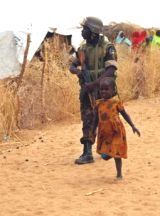Sudan to accept UN force but wants to save face – analysts
May 17, 2006 (KHARTOUM) — Sudan is ready to accept the deployment of UN peacekeepers in Darfur despite defiant rhetoric catering to domestic opinion hostile to what is perceived as a US-engineered intervention, analysts say.
 While President Omar al-Beshir once threatened to turn Darfur into “a graveyard” for foreign troops, his regime has since signalled it would accept the deployment.
While President Omar al-Beshir once threatened to turn Darfur into “a graveyard” for foreign troops, his regime has since signalled it would accept the deployment.
“We are ready to negotiate with the United Nations” on its peacekeeping project, Information Minister Zahawi Ibrahim Malek told AFP in an interview.
African Union (AU) troops dispatched to Darfur in 2004 have failed to contain the violence and the international community has insisted that their replacement by UN peacekeepers was key to the success of the latest peace effort.
Under pressure from Washington, the government and the largest Darfur rebel faction signed a peace agreement in Abuja on May 5, but two smaller factions have thus far refused to endorse the deal.
More than three years of civil war and famine in Darfur have left some 300,000 people dead and 2.4 million displaced.
Malek emphasised that a UN deployment would only take place at Khartoum’s explicit request but said that “if Sudan deems that the situation requires such a deployment, we have no objection because we are part of the United Nations.
“There was a time when we were totally opposed to the idea of a deployment by any troops other than the African Union. But the present situation has its own imperatives,” he said.
At an AU Peace and Security Council meeting in Addis Ababa earlier this week, Nigerian Foreign Minister Olu Adeinji said Khartoum was no longer adamantly opposed to a deployment but wanted to discuss the modalities.
“The only issue we are not willing to negotiate is the sovereignty of Sudan over its territory,” Malek added, ahead of next month’s visit by a UN Security Council delegation.
On Tuesday, the council unanimously adopted a resolution urging speedy implementation of the peace accord and threatening “strong and effective measures” against those standing in the way.
The resolution also called on the Abuja parties to cooperate to speed up the transition to a UN operation, and endorsed Monday’s decision by the AU Peace and Security Council that “concrete steps” be taken to that end.
Beshir’s Islamist regime has come under huge international pressure over the exactions committed by its proxy pro-Arab Janjaweed militias in Darfur, the first time a US president identified a genocide as it was happening.
“There’s nothing inconsistent on the part of the Sudanese government with letting the UN deploy,” a Western diplomat said. “But it’s important for them to retain face.”
“The government will accept the UN deployment,” predicted Hassan Mekki, who teaches political science at Khartoum’s African University.
“But it is waiting for guarantees so it can go and explain to the Arab tribes that the ‘blue helmets’ are not coming to combat them,” he said.
In an audio tape broadcast last month and attributed to Osama bin Laden, the Al-Qaeda supremo called for jihad (holy war) against Western “Crusaders” in Darfur, in what was seen as an attempt to turn the troubled Sudanese region into a new frontline.
Beshir’s regime sheltered bin Laden during the early 1990s.
The partial peace agreement signed earlier this month under the aegis of the African Union calls for a “complete and verifiable” disarmament of the Janjaweed, which Mekki argued could pose a major problem.
“If foreign forces come with the aim of disarming the Arab tribes, this could lead to an Iraqi-style resistance, with attacks and eventually another war,” he said.
Mekki warned of the risk that Arab tribes would consider a deployment by UN peacekeepers as tantamount to a US intervention and that the government faced an uphill struggle to clarify the situation with public opinion.
With a UN deployment looking increasingly unavoidable, some Khartoum editorialists have warned that while the civil conflict in Darfur pitted Muslims against each other, warring parties would form a united front to face “Western Christian hegemony”.
Some 10,000 UN peacekeepers are already deployed in mainly-Christian southern Sudan in a bid to bolster the January 2005 peace deal that ended 21 years of north-south civil war.
(ST)
